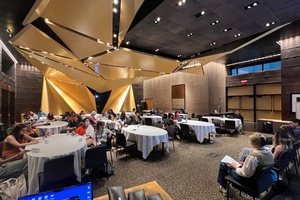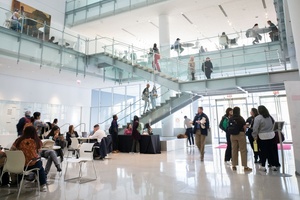Features:
What Do You Do, Again? Part II
The humans behind specialized news-nerd job titles talk about their work
As we approach the fifth anniversary of Source’s existence, we’re taking an anecdotal look at the humans who do the often confusingly described work of journalism technology, technology in journalism, data…stuff…in newsrooms, and so on: What exactly does a producer do? How about an engagement reporter? Is “data editor” the same role across newsrooms? We set out to discover what happens behind the titles, one job at a time. (Read Part One here.)
In our second installment, we pulled off an accidentally all-DC group by checking in with Brittany Mayes, Anne Li, and Steven Rich.
Brittany Mayes, Associate News Apps Developer at NPR
Source: What do you do in your daily work?
BM: In my day to day work, I do anything from graphics to data analysis and more. In a typical week, I probably turn around three to five graphics, work on a longer-term development task like addressing an issue in one of our rigs, do a considerable amount of infrastructure work (like work on templates for our data analysis), and lead our efforts to hire interns.
Source: Do you think other people with similar titles do roughly the same kinds of work?
BM: Not necessarily. I often feel like I’m in an “in-between” place as to what would be considered a designer and what would be considered a developer under many job titles I see in the industry.
Source: Does your title help clarify what you do, internally?
BM: I don’t think many people know my title. If they do, I don’t think they know what it is. Most people know me from how I introduce myself, which is as a person that does “graphics and dev” on the Visuals team because that’s what many people in our newsroom understand.
Source: Are there other opaque or confusing terms that come up for your team?
BM: In our internal system, everyone on my team is either a “news apps developer” or a “news apps designer,” which I find highly confusing and opaque. There are five members on my team who all do drastically different things in our weekly work, and yet we are filed under only two labels.
Source: When people not in tech or journalism ask what you do, what do you tell them?
BM: “Graphics and web stuff for NPR Visuals” then I proceed to tell them that no, I don’t run our site. I make visual content. At which point, I’ll evaluate whether or not they know anything about what I do and work on where to take the conversation (or just change the subject).
Anne Li, Interactive Audio Producer at the Washington Post
Source: What do you do in your daily work?
AL: I’m the interactive audio producer at the Washington Post, which means I work on any audio product that isn’t a podcast. I focus on our Amazon Echo and Google Home products, but I also work with reporters and editors on creating audio-visual stories that exist online. I start my day at 5:30 a.m. so that I can produce our Capital Weather Gang weather flash briefing and our political flash briefing called The Daily 202’s Big Idea.
Source: Do you think other people with similar titles do roughly the same kinds of work?
AL: I’ve never heard of anyone with a similar title to mine! If you’re out there, hit me up!
Source: Does your title help clarify what you do, internally?
AL: I love my title but I actually rarely refer to myself by it even within The Post because it is such an unusual one. My boss was the one who once described my job as, “working on anything that isn’t a podcast.” I really liked that way of putting it, so I usually say, “I’m the audio producer who works on anything that isn’t a podcast” or “who focuses on our Amazon Echo and Google Home products.”
Source: Have you had titles in the past that you found difficult to explain to other journalism folks?
AL: The only time I had a confusing title was when I was an “editorial assistant” for NPR One. But “editorial assistant” sounds less otherworldly for most journalists than “interactive audio producer,” so few people would ask questions about it.
Source: When people not in tech or journalism ask what you do, what do you tell them?
AL: I usually say that I work on stories for Google Home and Amazon Echo. If I have to respond in Chinese (my second language)…it’s a lot harder. I usually get one of two responses–folks either think I have the coolest job ever, OR they think I’m crazy (but they’re very polite in their reactions).
Steven Rich, Database Editor at the Washington Post
Source: What do you do in your daily work?
SR: Database Editor for Investigations. I acquire, clean and analyze data. I report. I act as a liaison between other reporters and our graphics reporters.
Source: Do you think other people with similar titles do roughly the same kinds of work?
SR: Yes.
Source: Does your title help clarify what you do, internally?
SR: No. It’s a title that’s existed for a long time, but it’s not too accurate. In fact, it kept me out of the union for a bit because my title was editor. But I’m a reporter. And sometimes that’s difficult to get across. Sure, it makes me sound super important, but the reality is that I’m just a reporter who’s really good with data.
Source: Are there other opaque or confusing terms that come up for your team?
SR: Not really. When we hired Andrew Tran, we hired him as a data reporter, which is really much more accurate and less confusing. Though it did increase the confusion a bit for my title as I am not his editor and we do basically the same thing (him for the rapid-response side of the team and me for the long-term side).
Source: When people not in tech or journalism ask what you do, what do you tell them?
SR: That I’m an investigative reporter. It’s easier to explain and more accurate.
People
Credits
-
 Anne Li
Anne Li
Anne Li is the interactive audio producer at the Washington Post, meaning she spends a lot of time talking with Amazon Echo and Google Home devices. She was previously a reporter for West Virginia Public Broadcasting and an undergraduate fellow at the Northwestern University Knight Lab. She hails from Athens, Ohio.
-
 Brittany Mayes
Brittany Mayes
Brittany Mayes is a graphics reporter for The Washington Post. Before joining The Post, she worked at NPR on the visuals team where she began as an intern and was later hired as a news applications developer. Her passions include structure and process, diversity and inclusivity, education and mentorship. She’s a 2016 alumna of the University of North Carolina and the New York Times Student Journalism Institute.
-
 Steven Rich
Steven Rich
Steven Rich is the database editor for investigations at the Washington Post. He’s also a board member of Investigative Reporters and Editors. He’s a (fairly recent) grad of Virginia Tech and Mizzou.




